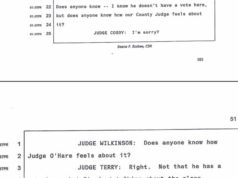OK, it’s time for New Year’s resolutions: Lose weight; check. Cut back on the vino; check. Be kinder to strangers; check. And … die quicker from cigarettes; check.
On Jan. 1 the State of Texas begins enforcing the Let’s Secretly Kill All Smokers Act. That’s not its real name, but it is how some smokers view the new law that means only “fire-safe” cigarettes can be sold in Texas from now on.
For all you pure-lung’d people out there who don’t know any better, fire-safe cigarettes are designed to snuff themselves out rather than continue burning when they’re left unattended in an ashtray … or on a couch cushion … or a mattress. The state insists the “safer” cigarettes pose no more health threat than earlier versions of the cancer sticks, but not everyone believes it. Of course, they do seem to be safer for anyone who lives in a house with a smoker who tends to leave ciggies burning indiscriminately.
“Who knows what chemicals they put in there to make the cigarettes quit burning?” said a local smoker, who added that it’s a pain in the ass when a cigarette goes out after it sits for a few seconds – but did not make reference to what chemicals like tar, ash, and nicotine have been doing to his body for years.
Insurers, state officials, and others point to a Harvard School of Public Health study that concludes that the cigarettes are made more fire-safe by adding tiny “speed bumps” in the paper, not by adding chemicals to the tobacco. However, the report also shows that fire-safe cigarette smoke nonetheless contains a slight increase in chemicals. Researchers recommended more studies to solve the contradictions. Lawmakers passed new laws anyway. And smokers are going to die even sooner, which is just fine with legislators, insurance companies, fire marshals, non-smokers, and just about everybody except for cigarette makers.
Don’t Hold Your Breath
Fort Worth’s daily newspaper has coddled if not brazenly protected the natural gas industry ever since the explosion of the Barnett Shale almost a decade ago. Now the paper has finally grown a pair of (eye)balls and taken a hard look at how the industry is affecting the local water supply. “Rural residents worry about Barnett Shale disposal wells” was the headline in the Dec. 26 edition of the Fort Worth Star-Telegram, and reporters Mike Lee and Elizabeth Campbell wrote about how residents reported trouble with their groundwater wells after gas drillers moved into the area. The story also noted that gas drillers and state regulators deny any correlation between gas wells and water pollution, despite an avalanche of circumstantial evidence. The drilling industry says chemicals used in drilling are safe but has successfully fought like hell to keep from having to reveal them. Nice.
Let’s see … seems like Fort Worth Weekly wrote about the correlation between gas drilling and groundwater problems a little earlier than that – say, more than four years ago in a story (‘Til Your Wells Run Dry,” June 29, 2005) that drew heat from the industry and skepticism from drilling advocates. But other newspapers, most notably the Denton Record Chronicle and Texas Observer, soon began writing similar stories about drilling’s impact on water sources.
The Star-Telegram continued to ignore the obvious for years and wrote countless love notes to drillers in the form of “news” articles that read more like public relations releases. After all, city leaders such as Mayor Mike Moncrief kept saying how good the shale was for the Fort, and why would the local newspaper disagree with the mayor?
Still, welcome aboard, Star-T. Better late than never – though the thousands of people whose air and water have been poisoned by drilling activities in the intervening years might not agree.











